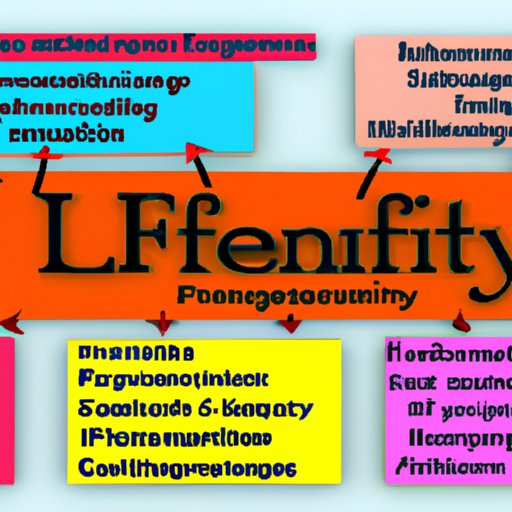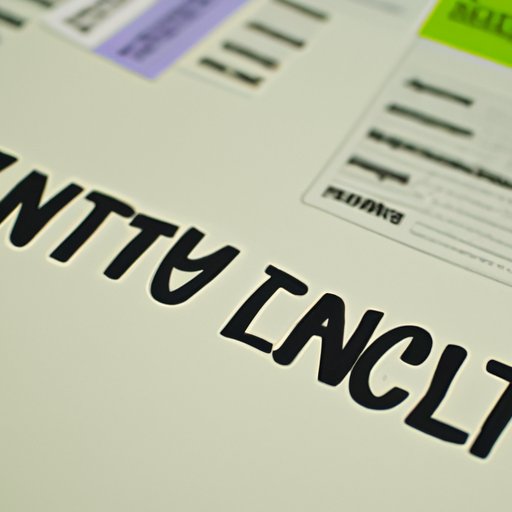Introduction
Financial literacy is a critical life skill that everyone should have. It involves understanding fundamental financial concepts, building wealth, and making smart decisions when it comes to money. Having a strong grasp on financial literacy can help people manage their money better, achieve financial independence, and live a happier life. But what is financial literacy? In this article, we’ll explore the definition of financial literacy and the benefits of being financially literate.

Overview of Financial Literacy: Definition and Benefits
Financial literacy is defined as “the ability to understand and effectively use various financial skills, including personal financial management, budgeting, and investing.” It includes an understanding of basic financial concepts, such as income, expenses, savings, debt, investments, and taxes, as well as the ability to use this knowledge to make sound financial decisions. Being financially literate allows people to save and invest wisely, plan for retirement, and protect their finances from risks.
What Is Financial Literacy and Why Is It Important?
Financial literacy is important because it helps people manage their money more effectively. People who are financially literate are able to make wise decisions about their spending and investing, build wealth, and avoid costly mistakes. According to a study by the FINRA Investor Education Foundation, people who have a basic understanding of financial concepts are more likely to be financially secure and have less debt.
“The importance of financial literacy cannot be overstated,” says Michael Finke, professor of personal financial planning at Texas Tech University. “It’s essential for understanding how to make the most of our resources, plan for the future, and protect ourselves from financial risks.”
A Beginner’s Guide to Understanding Financial Literacy
Understanding financial literacy requires some effort on the part of the individual. Here are some tips for getting started:
- Set financial goals. Establishing financial goals is an important first step for becoming financially literate. Goals can range from short-term objectives, such as saving for a vacation or reducing debt, to long-term plans, such as saving for retirement or buying a home.
- Save and invest. Setting aside money for savings and investing is another key component of financial literacy. Investing in stocks, bonds, mutual funds, and other securities can help individuals grow their wealth over time.
- Manage debt. Understanding how to manage debt is essential for financial success. Learning how to effectively budget, pay off debt, and avoid taking on too much debt can help individuals stay out of financial trouble.
Understanding Financial Literacy: A Comprehensive Guide
Once you’ve established a basic understanding of financial concepts, there are several additional topics to consider. These include:
- Budgeting. Creating a budget is a crucial part of financial literacy. Budgeting helps individuals track their income and expenses, identify areas where they can cut back, and plan for the future.
- Credit scores. Credit scores play a major role in determining an individual’s financial health. Understanding how credit scores are calculated and what factors influence them can help individuals improve their scores and access better loan terms.
- Insurance. Insurance helps protect individuals and their families from financial hardship in the event of an illness, accident, or other unforeseen event. Understanding different types of insurance, such as health, life, and auto insurance, can help people make informed decisions about their coverage.

The Essentials of Financial Literacy: What You Need to Know
In addition to the topics listed above, there are several other aspects of financial literacy that should be understood. These include:
- Retirement planning. Planning for retirement is an important part of financial literacy. Understanding different retirement options, such as 401(k)s and IRAs, and creating a retirement plan can help individuals prepare for the future.
- Tax planning. Tax planning is essential for minimizing taxes and maximizing returns. Understanding tax laws, deductions, credits, and filing requirements can help individuals ensure they’re paying the right amount of taxes each year.
- Estate planning. Estate planning is important for making sure your assets are protected and distributed according to your wishes after you pass away. Understanding estate planning documents, such as wills and trusts, can help individuals ensure their assets are handled properly.

Financial Literacy: What It Is and How It Can Help You
Having a strong grasp of financial literacy can provide numerous advantages. These include:
- Improving financial security and stability.
- Helping to make smarter financial decisions.
- Reducing the risk of financial difficulties.
- Enabling individuals to build wealth.
- Providing peace of mind.
There are many resources available to help individuals become more financially literate. These include books, online courses, podcasts, and workshops. Taking advantage of these resources can help individuals gain the knowledge and skills needed to make the most of their money.
Conclusion
Financial literacy is an essential life skill that everyone should strive to acquire. It involves understanding fundamental financial concepts, building wealth, and making smart decisions when it comes to money. Having a strong grasp on financial literacy can help people manage their money better, achieve financial independence, and live a happier life. We hope that this article has provided a comprehensive overview of the definition and benefits of financial literacy.
(Note: Is this article not meeting your expectations? Do you have knowledge or insights to share? Unlock new opportunities and expand your reach by joining our authors team. Click Registration to join us and share your expertise with our readers.)
